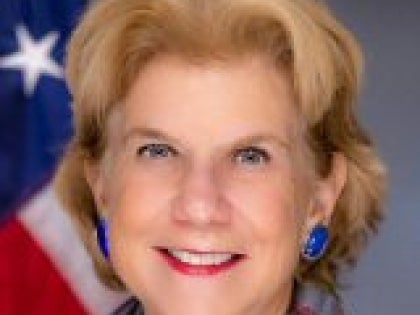
Senate majority pushes legislative package with voting, election reform
ALBANY, N.Y. (NEXSTAR) — Legislators from the State Senate Majority’s standing committee on elections convened to announce a slate of voter rights bills and election reforms. According to Senate Majority Leader Andrea Stewart-Cousins, it was the seventh-annual installment of a tradition to lead off session with proposals to make it easier for New Yorkers to vote.
The new Elections Committee Chair, Sen. Kristen Gonzalez, said she felt excited to lead the committee in the new year. “It’s no secret that our democracy is under threat,” she said, adding that the legislature is up to meeting that threat. She and her fellow Democrats laid out the following bills that they’re supporting in this year’s legislative session:
S1085 outlaws spreading disinformation about voting—like the time, place, or voter requirements—that’s meant to stop people from voting. It outlaws abuses of power and using threats or force to prevent someone from voting or to pressure them to vote in a certain way. Violators would potentially face felony charges, jail time, and fines.
“Every New Yorker deserves to cast their ballot without fear of being misled or silenced,” said Sen. Stewart-Cousins, who sponsored the disinformation bill.
S324 bans businesses with foreign ties from spending and making political contributions in New York’s elections. To prevent foreign interference in state and local elections, the Democracy Preservation Act would prohibit the funding of campaigns, political ads, or committees from companies with foreign ownership or influence. Businesses must certify that they have no foreign when making a political donation. Violations would earn felony charges, fines, and civil penalties.
S88 simplifies voter registration by letting eligible New Yorkers register or update voter records through the DMV. It requires DMV customers to confirm whether they want to register to vote as part of regular license and registration transactions. Someone who applies electronically can use their DMV signature for voter registration, and any voter updates would automatically be forwarded to the local Board of Elections. It tells New Yorkers about eligibility, confidentiality, and penalties for false registrations, and party affiliation.
S1030 expands political disclosure requirements by requiring public websites that have been paid for or operated by political committees to clearly display that committee’s identity on every page. Such “Paid for by” language already applies to brochures, flyers, posters, and mailings.
S569 lets county boards of elections create county-wide, catch-all polling places for Election Day. County-wide centers still have to follow all standard voting and polling rules and get approval from the state Board of Elections.
S1087 would create full-time positions for two board of elections commissioners in counties outside of New York City. Counties with populations over 120,000—namely Westchester, Erie, Monroe, Onondaga, Orange, Rockland, Albany, Dutchess, Saratoga, Oneida, Niagara, Broome, Ulster, Schenectady, Rensselaer, and Chautauqua Counties, plus Long Island—can still pass local laws to have four commissioners instead of two.
“People want to know that there is not a distraction [among elections commissioners], something is not more important than what actually happens during that election, that the two commissioners of two parties are fully invested in making sure it’s a fair process, and it is a process that has their entire attention,” said bill sponsor Sen. Shelley Mayer.
S1036 lets voters in New York register to vote at any residence where they maintain an ongoing, continuous connection. This would mean that they could potentially vote absentee from a municipality where they have a second home or college student housing.
S1035 would require election commissioners and Board of Elections staff to undergo mandatory training offered by the state. Within six months of being appointed, they’ll need to complete no more than 30 hours of coursework on how boards of elections operate. They’ll also have to take at least three hours of continuing education coursework by June 1 every year.
S1356 requires New York to join a multistate voter list maintenance organization—like the Electronic Registration Information Center, for example—by July 31, 2026, to keep voter rolls accurate and up-to-date. The state would have to designate an official representative in the organization and would be able to withdraw if authorized by a vote from Board of Elections commissioners.
“This bill has everything to do with making sure that there is a high level of confidence in electoral outcomes in this state,” said Sen. James Skoufis, who sponsored the bill.
Just down the hall in the New York State Capitol, State Senate Republicans held a press conference to advance their own legislative agenda. Here’s Senate Minority Leader Rob Ortt talking about the shortcomings of the Democrats’ voting rights agenda:
“One thing that’s really disappointing in the elections package that the Democrats have put forward today is that it is devoid of any voter ID changes whatsoever in the state of New York,” said Sen. Mark Walczyk, the Republicans’ ranking member on the elections committee.
Walczyk and Ortt both called attention to Ortt’s previous S7876/A6297 voter ID legislation.
On Election Day in New York, poll workers compare on-file signatures from New Yorkers to verify identities. Although New Yorkers don’t typically need to present an identification card at the polls, they do need to provide one when initially registering to vote.


